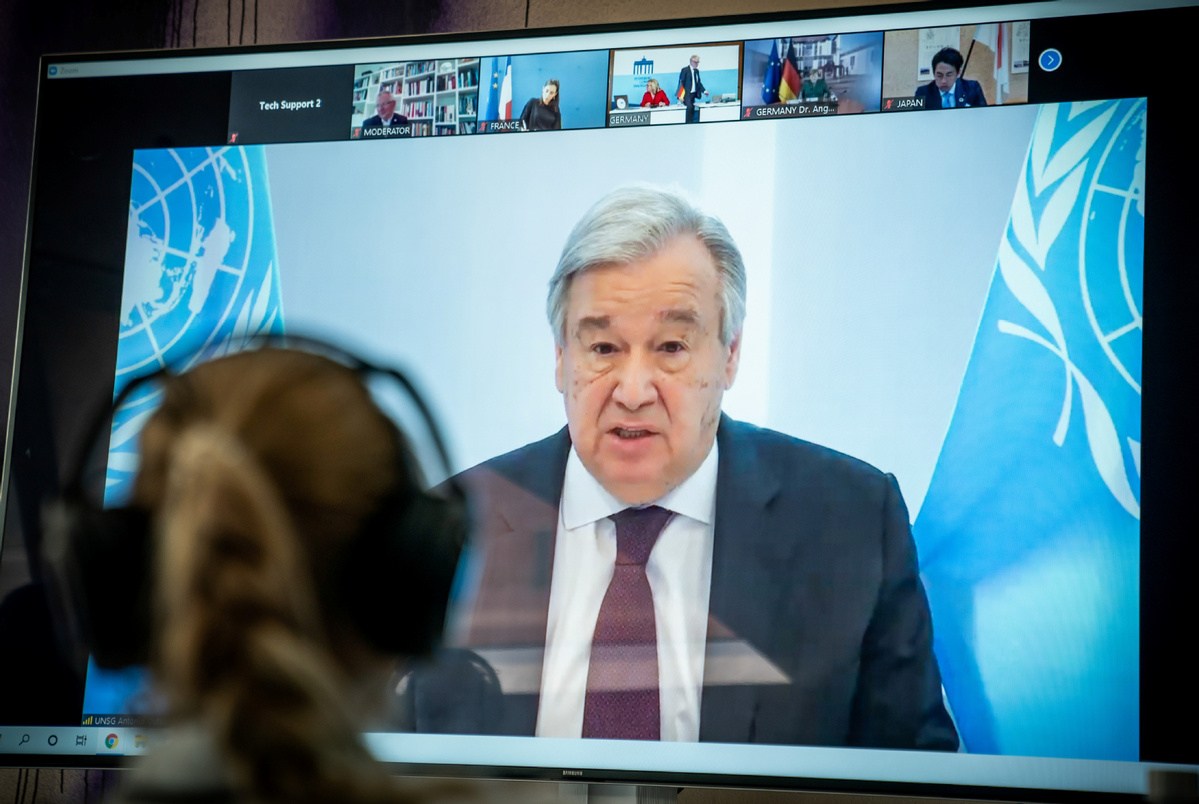Plea for solidarity to fight global 'tsunami of hate'
By Harvey Morris | China Daily Global | Updated: 2020-05-12 10:17

The world is facing a parallel threat alongside the COVID-19 crisis, according to United Nations Secretary-General Antonio Guterres, who warned of a "tsunami of hate" that has accompanied the spread of the virus.
In a global appeal in which the UN chief called for international solidarity, he lamented that "the pandemic continues to unleash a tsunami of hate and xenophobia, scapegoating and scare-mongering".
When Beijing was still tackling the peak of its own health crisis, people of Chinese origin faced physical and verbal abuse in a number of Western countries from those who linked them to the spread of the novel coronavirus.
Since then, such prejudice has spread like the virus to attack any minority that excites the hatred of the xenophobes-migrants, refugees, Muslims, Jews and even the elderly.
Although the so-called alt-right has been at the forefront of spreading anti-minority smears online, some politicians have contributed to fuelling the phenomenon.
At a time when experts were warning against labeling the new disease "the China virus", United States President Donald Trump did just that, publicly using the phrase more than 20 times in the second half of March.
Since then the pandemic has provoked a bonanza of misinformation from online conspiracy theorists, who have targeted not just minorities but also individuals, such as philanthropists George Soros and Bill Gates.
In a recent broadcast, the far-right, pro-Trump One America News Network linked Soros, Gates, the "deep state" and China to a global conspiracy to establish sweeping population control-and even threw former US president Bill Clinton into the mix for good measure.
More of the same can no doubt be anticipated in a febrile US election year in which the administration appears focused on blaming everyone except itself for the failings of the pandemic response.
The UN's Guterres, in his Friday appeal, said all societies needed to strengthen their immunity to the virus of hate. And, without naming names, he called on politicians "to show solidarity with all members of their societies and build and reinforce social cohesion".
In the UK, where police recorded a sharp increase in hate crimes against Chinese people as the COVID-19 outbreak took hold, online agitators have aired fake videos that appear to show British Muslims breaking lockdown regulations by attending mosques.
In France, one far-right website listed the names of Jewish experts in charge of the country's health system and denounced the efforts of a Jewish politician to ease the pressure on French prisons as a plot to "liberate 7,000 black and Arab cut-throats".
In Germany meanwhile, experts warned against the rise of what they called "pandemic populism" in which online conspiracists sought to link the health crisis to a range of their favorite political targets. The danger was that even the most outlandish claims could seep into the mainstream media or be spread by unwitting celebrities.
The UN's World Health Organization, already fully occupied with tackling the global response to COVID-19, has complained of an "infodemic "swirling across society.
Despite the concerns the conspiracy phenomenon is provoking among these experts and officials already working overtime to cope with the crisis, there are some signs of a fightback.
In Texas, the San Antonio City Council unanimously passed a resolution denouncing bigotry, anti-Semitism, crimes against Asian Americans and hate speech amid the pandemic.
On a global level, the UN is launching a new communications initiative "based on science, solutions and solidarity to fight misinformation".
"Fear, uncertainty, and the proliferation of fake news have the potential to weaken the national and global response to the virus, bolster nativist narratives and provide opportunities for those who may seek to exploit this moment to deepen social divisions," said Melissa Fleming, UN under-secretary-general for Global Communications, who is leading the campaign.
The campaign involves providing authoritative scientific information to counter myths and partnering with the big tech companies to get those messages online. It will also work more closely with journalists to combat falsehoods, fabrications and misinformation.
The UN and national authorities clearly hope the still, small voice of common sense can overcome the fog horn of nonsense, intentional or otherwise, that threatens to dominate the current debate.
Let us hope it is so. The world can deal with a physical pandemic, but the effort will be that much greater if it has to handle an informational one at the same time.
Harvey Morris is a senior media consultant for China Daily UK
























